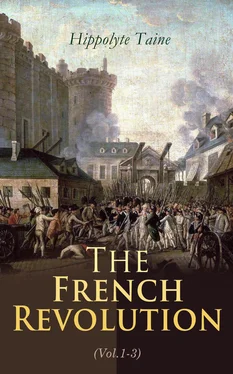Hippolyte Taine
The French Revolution
(Vol.1-3)
Complete Edition
e-artnow, 2020
Contact: info@e-artnow.org
EAN 4064066060053
Volume 1 Volume 1 Table of Contents
Volume 2 Конец ознакомительного фрагмента. Текст предоставлен ООО «ЛитРес». Прочитайте эту книгу целиком, купив полную легальную версию на ЛитРес. Безопасно оплатить книгу можно банковской картой Visa, MasterCard, Maestro, со счета мобильного телефона, с платежного терминала, в салоне МТС или Связной, через PayPal, WebMoney, Яндекс.Деньги, QIWI Кошелек, бонусными картами или другим удобным Вам способом.
Volume 3 Конец ознакомительного фрагмента. Текст предоставлен ООО «ЛитРес». Прочитайте эту книгу целиком, купив полную легальную версию на ЛитРес. Безопасно оплатить книгу можно банковской картой Visa, MasterCard, Maestro, со счета мобильного телефона, с платежного терминала, в салоне МТС или Связной, через PayPal, WebMoney, Яндекс.Деньги, QIWI Кошелек, бонусными картами или другим удобным Вам способом.
Table of Contents Table of Contents Volume 1 Volume 1 Table of Contents Volume 2 Конец ознакомительного фрагмента. Текст предоставлен ООО «ЛитРес». Прочитайте эту книгу целиком, купив полную легальную версию на ЛитРес. Безопасно оплатить книгу можно банковской картой Visa, MasterCard, Maestro, со счета мобильного телефона, с платежного терминала, в салоне МТС или Связной, через PayPal, WebMoney, Яндекс.Деньги, QIWI Кошелек, бонусными картами или другим удобным Вам способом. Volume 3 Конец ознакомительного фрагмента. Текст предоставлен ООО «ЛитРес». Прочитайте эту книгу целиком, купив полную легальную версию на ЛитРес. Безопасно оплатить книгу можно банковской картой Visa, MasterCard, Maestro, со счета мобильного телефона, с платежного терминала, в салоне МТС или Связной, через PayPal, WebMoney, Яндекс.Деньги, QIWI Кошелек, бонусными картами или другим удобным Вам способом.
PREFACE
BOOK FIRST. SPONTANEOUS ANARCHY. CHAPTER I. THE BEGINNINGS OF ANARCHY.
I.—Dearth the first cause.
II.—Expectations the second cause
III.—The provinces during the first six months of 1789
IV.—Intervention of ruffians and vagabonds.
V.—Effect on the Population of the New Ideas.
VI.—The first jacquerie in Province
CHAPTER II. PARIS UP TO THE 14TH OF JULY.
I.—Mob recruits in the vicinity
II. The Press.
III.—The Réveillon affair.
IV.—The Palais-Royal.
V.—Popular mobs become a political force.
VI.—July 13th and 14th 1789.
VII.—Murders of Foulon and Berthier.
VIII.—Paris in the hands of the people.
CHAPTER III.
I.—Anarchy from July 14th to October 6th, 1789
II.—The provinces
III.—Public feeling.—Famine
IV.—Panic.
V.—Attacks on public individuals and public property.
VI.—Taxes are no longer paid.
VII.—Attack upon private individuals and private property.
CHAPTER IV. PARIS.
I.—Paris.
II.—The distress of the people.
III.—The new popular leaders.
IV.—Intervention by the popular leaders with the Government.
V.—The 5th and 6th of October.
VI.—The Government and the nation in the hands of the revolutionary party.
BOOK SECOND. THE CONSTITUENT ASSEMBLY, AND THE RESULT OF ITS LABORS. CHAPTER I.—CONDITIONS REQUIRED FOR THE FRAMING OF GOOD LAWS.
I.—These conditions absent in the Assembly
II.—Inadequacy of its information.
III.—The Power Of Simple, General Ideas.
IV.—Refusal to supply the ministry
CHAPTER II. DESTRUCTION.
I.—Two principal vices of the ancient régime.
II—Nature of societies, and the principle of enduring constitutions.
III.—The estates of a society.
IV.—Abuse and lukewarmness in 1789 in the ecclesiastical bodies.
CHAPTER III. THE CONSTRUCTIONS—THE CONSTITUTION OF 1791.
I.—Powers of the Central Government.
II.—The Creation Of Popular Democracy.
III.—Municipal Kingdoms.
IV.—On Universal Suffrage.
V.—The Ruling Minority.
VI.—Summary of the work of the Constituent Assembly.
BOOK THIRD. THE APPLICATION OF THE CONSTITUTION. 3101 CHAPTER I.
I.—The Federations.
II.—Independence of the municipalities.
III.—Independent Assemblies.
CHAPTER II. SOVEREIGNTY OF UNRESTRAINED PASSIONS.
I.—Old Religious Grudges
II.—Passion Supreme.
III.—Egotism of the tax-payer.
IV.—Cupidity of tenants.
CHAPTER III. Development of the ruling Passion.
I.—Attitude of the nobles. Their moderate resistance.
II.—Workings of the popular imagination with respect to them.
III.—Domiciliary visits.
IV.—The nobles obliged to leave the rural districts.
V.—Persecutions in private life.
VI.—Conduct of officers.
VI.—Conduct of the officers.
VII.—Emigration and its causes.
VIII.—Attitude of the non-juring priests.
IX.—General state of opinion.
Table of Contents
This second part of "Les Origines de la France Contemporaine" will consist of two volumes.—Popular insurrections and the laws of the Constituent Assembly end in destroying all government in France; this forms the subject of the present volume.—A party arises around an extreme doctrine, grabs control of the government, and rules in conformity with its doctrine. This will form the subject of the second volume.
A third volume would be required to criticize and evaluate the source material. I lack the necessary space: I merely state the rule that I have observed. The trustworthiest testimony will always be that of an eyewitness, especially
* When this witness is an honorable, attentive, and intelligent man,
* When he is writing on the spot, at the moment, and under the dictate of the facts themselves,
* When it is obvious that his sole object is to preserve or furnish information,
* When his work instead of a piece of polemics planned for the needs of a cause, or a passage of eloquence arranged for popular effect is a legal deposition, a secret report, a confidential dispatch, a private letter, or a personal memento.
The nearer a document approaches this type, the more it merits confidence, and supplies superior material.—I have found many of this kind in the national archives, principally in the manuscript correspondence of ministers, intendants, sub-delegates, magistrates, and other functionaries; of military commanders, officers in the army, and gendarmerie; of royal commissioners, and of the Assembly; of administrators of departments, districts, and municipalities, besides persons in private life who address the King, the National Assembly, or the ministry.
Читать дальше












